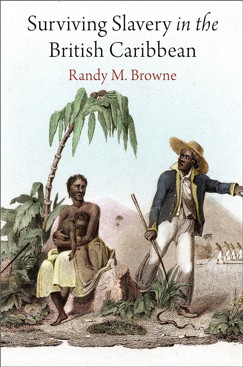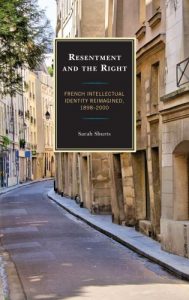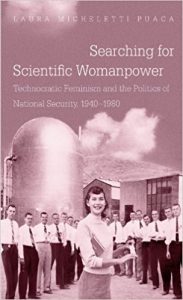I am grateful to have an opportunity to serve as Director of Graduate Studies. The students continue to delight me with their fascinating projects, their insights, their cooperative spirit, and their enthusiasm—to say nothing of their very hard work. It is truly a pleasure to succeed someone as supremely competent and wonderfully innovative as Chad Bryant, and he has been quite generous with his time and expertise during the transition.
 Our recent graduates have accomplished a great deal, including at least three books and four prizes. Jacqueline Olich received the 2017 Triangle Business Journal Women in Business Award. Randy Browne has just published Surviving Slavery in the British Caribbean. Sarah Shurts’s book Resentment and the Right: French Intellectual Identity Reimagined, 1898-2000 came out this year.
Our recent graduates have accomplished a great deal, including at least three books and four prizes. Jacqueline Olich received the 2017 Triangle Business Journal Women in Business Award. Randy Browne has just published Surviving Slavery in the British Caribbean. Sarah Shurts’s book Resentment and the Right: French Intellectual Identity Reimagined, 1898-2000 came out this year.
Laura Puacca’s article “The Largest Occupational Group of All the Disabled: Homemakers with Disabilities and Vocational Rehabilitation in Postwar America,” in Disabling Domesticity received the award for Best Article from the Disability History Association. Puacca was also awarded the Margaret W. Rossiter History of Women in Science Prize for the best book on the role of women in science for Searching for Scientific Womanpower: Technocratic Feminism and the Politics of National Security, 1940-1980.
Jessie Wilkerson received the A. Elizabeth Taylor Prize for best article on southern women’s history from the Southern Association for Women Historians. I would love to include your news in upcoming newsletters and on our soon-to-be-debuted new web site. Please send information!
 Over the past year, ten students obtained doctorates, having completed dissertations on a wide range of topics, including foreign relations in ancient Rome, Jewish flight from Bohemia during World War II, Ukrainian nationalism, African-American struggles for economic justice, and reform in the US army. This fall, seventeen new students have joined the department. Admission this year was as competitive as ever, and our current students have already begun to make their mark as historians. Daniela Weiner has just published an article in the journal Modern Jewish Studies. Robert Richard’s article on the Great Depression, populism, and the banking industry was published in Tennessee Historical Quarterly. Louis Porter won the 2017 Association for Slavic, East European, and Eurasian Studies (ASEEES) Graduate Student Essay Prize for the best graduate essay during the year in recognition of his “No ‘Neutral Men’: A Day in the Life of a Soviet International Civil Servant, 1956-1967.”
Over the past year, ten students obtained doctorates, having completed dissertations on a wide range of topics, including foreign relations in ancient Rome, Jewish flight from Bohemia during World War II, Ukrainian nationalism, African-American struggles for economic justice, and reform in the US army. This fall, seventeen new students have joined the department. Admission this year was as competitive as ever, and our current students have already begun to make their mark as historians. Daniela Weiner has just published an article in the journal Modern Jewish Studies. Robert Richard’s article on the Great Depression, populism, and the banking industry was published in Tennessee Historical Quarterly. Louis Porter won the 2017 Association for Slavic, East European, and Eurasian Studies (ASEEES) Graduate Student Essay Prize for the best graduate essay during the year in recognition of his “No ‘Neutral Men’: A Day in the Life of a Soviet International Civil Servant, 1956-1967.”
The promise of future historical scholarship has brought our students distinguished research opportunities as well. Alyssa Skarbek has been awarded a Fulbright-Hays Fellowship to conduct field research in Mexico. Lindsay Ayling has received a Fellowship from the UNC Graduate School, Robert Richard has received a Fellowship for research in Philadelphia, and Robert Colby received four short-term grants from a variety of institutions across the south for his work on the Civil War slave trade. Mary Elizabeth Walters has been named an Adams Fellow for the Public Humanities at Carolina Public Humanities. This is a small sampling. Please send news of your own accomplishments for the spring newsletter.
 The History Department continues to offer innovative programs for and with the talents of our students. Erica Huckestein is leading the preparations for the King’s College exchange annual spring conference on protest, revolt, and revolution. Mishio Yanamaka has been named mentor for the department’s new “Re-envisioning the Humanities” grant. Our first session focused on how our graduate students have been using digital mapping to get a more accurate look at the past. Mishio talked about mapping census data in New Orleans to get a clearer picture of the effects of Reconstruction-era education for the city’s African Americans, and Gabe Moss showed us how he is using maps to clarify Roman military campaigns. Our next event is a full-day intensive training session on using Digital Humanities in teaching.
The History Department continues to offer innovative programs for and with the talents of our students. Erica Huckestein is leading the preparations for the King’s College exchange annual spring conference on protest, revolt, and revolution. Mishio Yanamaka has been named mentor for the department’s new “Re-envisioning the Humanities” grant. Our first session focused on how our graduate students have been using digital mapping to get a more accurate look at the past. Mishio talked about mapping census data in New Orleans to get a clearer picture of the effects of Reconstruction-era education for the city’s African Americans, and Gabe Moss showed us how he is using maps to clarify Roman military campaigns. Our next event is a full-day intensive training session on using Digital Humanities in teaching.
The History Department has been participating in the American Historical Association’s Career Diversity for Historians initiative. The Chicago fall workshop focused on ways to help departments train the next generation of history professors while also educating historians who can contribute actively to many other professions. As we continue participating in this project, we need advice from our alumni. What have you done as a professional historian outside the academy? What additional training would have been helpful? How has being a historian been important in your work? I would love to talk with you.
Our graduate students remain central to the life of the department, providing not only award-winning teaching for our undergraduates but also enriching the intellectual life of the department. They engage with and reflect on faculty research-in-progress in their seminars, and present their own research in colloquia and in print. They have shown themselves to be a tremendous asset to all of the History Department’s projects, and the program continues to thrive because of their enthusiasm, insights, and commitment to understanding the past. Our department benefits enormously from their energy and thrives on their skills, despite the financial constraints that prevent our providing living-wage stipends and puts us (and them) at a disadvantage compared to our peer institutions. As Chad put it a year ago, “Our graduate students, in short, are the core of our department, and that, perhaps, is the most important thing to celebrate.”
–Sarah Shields, Director of Graduate Studies
